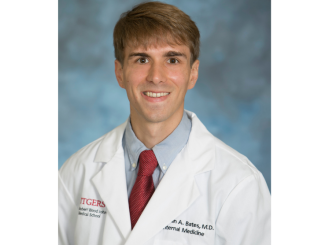Apr 18, 2023
By Geraldine Carroll, ASCO Publishing
The ASCO Journals Editorial Fellowship, which opened in 2018, introduces oncology fellows to the peer review, editing, and publishing process for medical research manuscripts. The current group of 12 editorial fellows has been shadowing experienced journal editors from the Journal of Clinical Oncology (JCO), JCO Oncology Practice (JCO OP), JCO Global Oncology (JCO GO), JCO Precision Oncology (JCO PO), and JCO Clinical Cancer Informatics (JCO CCI) to develop a critical eye for well-conducted research. The yearlong program will culminate in the fellows’ participation at the 2023 ASCO Annual Meeting.
Benjamin Bates, MD, is a JCO CCI editorial fellow, an instructor of medicine in the Division of General Internal Medicine at Rutgers-Robert Wood Johnson Medical School (RWJMS), and a core faculty member of the Center for Pharmacoepidemiology and Treatment Science at Rutgers Institute for Health. As a general internist focused on cancer treatment and survivorship care and outcomes, he aspires to develop a clinical program focused on the acute and long-term care of cancer survivors. He spoke with ASCO Connection about his experience in the editorial fellowship program and why he’s excited about ASCO23.
Why did you pursue an opportunity to be an editorial fellow with ASCO Journals?
BB: ASCO Journals collectively publishes innovative and impactful research on cancer surveillance, treatment, and health outcomes. The opportunity to learn from and interact with the editors and editorial staff of ASCO Journals was an incredibly strong pull for me to apply.
Based on your fellowship experience, what is the most essential skill for an editor?
BB: The ability and willingness to work in a collaborative environment is probably the most important skill of a good editor. While an editor may screen an article for publication and identify the relevant reviewers, the editorial staff have to quality screen and direct toward the most appropriate editor and the multidisciplinary team of selected reviewers must provide feedback on the study methods, results, and clinical/research implications. Every member of the editorial committee relies on the support of the editorial staff and the content expertise of the reviewers to identify and curate relevant submissions for the ASCO audience. Collaborative teamwork is crucial for an editor’s success.
What is your biggest takeaway from this experience?
BB: I have been most impressed with the thoughtfulness of editors to evaluate the clinical and societal impact of submitted studies. Research is conducted and published with the intention to improve the knowledge about treatment and outcomes along the survivorship spectrum. The editor must sift through a broad array of submissions to choose the most meaningful and appropriate studies for the journal and to potentially organize an accompanying editorial article that provides greater context to the study background, approach, or findings.
How will your experience as an editorial fellow enhance or inform your current role/research at your own institution? How will you leverage these skills at your own institution and share the lessons learned?
BB: As an early-career physician scientist, the mentorship I’ve received as a fellow has been extraordinarily meaningful. Following a research fellowship, I started as faculty in July 2022. One of my responsibilities as a clinical-research faculty is to co-lead the research education of internal medicine residents within the Clinician Research Track. Two years ago, we initiated an annual manuscript writing workshop for the residents; this year, we look forward to expanding the workshop to fellows and medical students. I’m using information obtained through the ASCO Journals Editorial Fellowship to curate the educational material for the workshop.
Can you comment on some of the current challenges in scientific publishing and how the fellowship addressed this?
BB: The editors take seriously the potential that authors may not be transparently reporting their methods and results. Each year the ASCO Journals receives thousands of submissions and only a few hundred will be published. It is extremely difficult, yet critical, for the editors to ensure the research submitted was conducted appropriately and send the right message to the clinical and research community. The growing complexity and more frequent linkage of real-world data sources, such as medical claims, electronic health care records, and registries, can be a burden on the editors and reviewers to recognize the limitations of studies.
How do you think your role as an editorial fellow will enhance your experience at the 2023 ASCO Annual Meeting?
BB: I better appreciate the complexity and breadth of materials submitted to ASCO Journals and look forward to taking the time to digest, learn from, and apply the information that is selected to be included at the ASCO Annual Meeting.
How do you plan to spend your time at ASCO23?
BB: As a clinician and researcher focused on care and outcomes of patients with cancer, ASCO23 is the largest educational and networking conference for me. As part of the ASCO Journals Editorial Fellowship, I’ve been working on a project to describe the reporting of studies that utilize large data sources for cancer research and the applicability of current reporting guidelines. We submitted preliminary findings from our project as an abstract to ASCO23 and are working toward completing the project with the goal of sharing final results of the project with the ASCO Journals editors at ASCO23.
I’m also looking forward to learning from and networking with clinicians, researchers, and advocates at each of the sessions. As an early-career clinician focused on cancer research, ASCO’s annual conference is important for my career growth. The conference also helps remind me why I am passionate about my clinical research—it’s inspiring to see such innovative and meaningful research all in one location.

